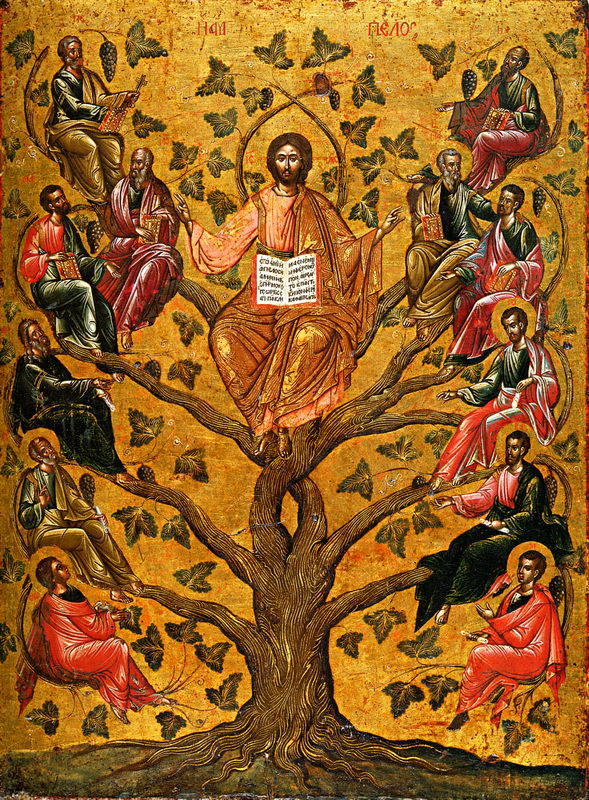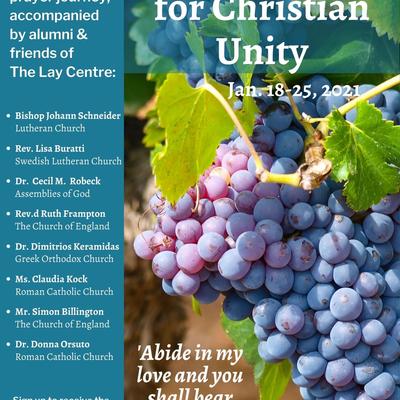
This year’s theme for the Week of Prayer for Christian Unity is “Abide in my love and you shall bear much fruit” (Jn 15:5-9). Each contributor to our series has reflected on a daily verse from this Scripture passage, as indicated by the Pontifical Council for Promoting Christian Unity, for each day of the octave.
Today, Day Six, Dr. Dimitrios Keramidas reflects on the verse “Go and bear fruit, fruit that will last” (Jn 15:16b).
Welcoming Others
By Dimitrios Keramidas
On the sixth day of the Week of Prayer for Christian Unity, we are invited to reflect on Jn 15:16b: “Go and bear fruit, fruit that will last.” This verse is from a longer passage (15:9-17) that speaks of the love among Christ and his disciples; this love is based on the love between the Father and the Son.
The love of friendship between the Lord and his followers is sanctified by his sacrifice — the supreme act of love. This love invites the disciples to go forth into the world and to bear lasting fruit. And it is of this love that Jesus speaks when he gives his disciples the commandment to love one another.
The nature of Jesus’ invitation is clear: to bear fruit is not something one does alone, but in friendship with the Lord, who is the only source of life, blessing and prosperity. For St. John Chrysostom, the friendship between God and man is a permanent one, while the invitation to bear fruit is a eucharistic metaphor of the vineyard. This implies that the harvesting of fruit must be at the service of the Lord. It is a Christian’s duty to extend the Christian “way of being” to all, that is, to witness to “unity in love,” which is God’s way of being and from which no one is excluded.
For Christians, unity means permanence in Christ. However this unity, precisely because it is founded on love — love as a way of being, and not as a sentiment — exists not for itself, but for others. In other words, the more a Christian lives their faith openly, the more Christ blesses fructification. And the more one remains at the service of Christ’s will, the more fruit one produces.
Therefore, “bearing fruit” is a constant commitment that implies a continuous openness, an extension of our way of being with the Lord, who invites us to be ready to lower our confessional barriers in order to encounter others. In this way, we become aware that fruit can only grow through our friendship with Christ. Fruit is not the merit of our own work, but only in the Lord can we bear eucharistic fruit with the permanent effects of communion with God and with others.
This year, the fruits of our ecumenical commitment may not be visible. Perhaps it will not be possible to pray together or to visit each other’s places of worship. But the path towards unity can open the way to a more intense, deeper, and perhaps more sincere prayer. Inspiration could be drawn from the Johannine image of the vineyard, which is unique, although it is composed — but not divided — into many branches.
Our identity belongs to the vineyard. The ecumenical goal is to understand both diversity — as a way of existence in Christian history — and the oneness of the vineyard, that is, the oneness of Christ in the Eucharist.
Converging towards Christ means drawing prayerfully closer to one another. However, to draw closer to one another without Christ means losing that centre of unity and prosperity that gives us the strength to grow as branches and blossom as fruit.
Suggested listening: Hymn of the Cherubim, from the Liturgy of St. John Chrysostom
Image Christ the True Vine - Eastern Orthodox icon of Jesus Christ as the True Vine (16th century). Wikipedia.
Dr. Dimitrios Keramidas (2009-2010) was born in Thessaloniki, Greece. He studied ecumenical theology in Greece and missiology in Rome, where he currently lives. He is an invited professor at the Pontifical University St. Thomas Aquinas (Angelicum) and in Greek academic institutions and an Alumnus of the Pontifical Gregorian University.
Link
-
What's happening in Rome - Week of Prayer for Christian Unity
-
Pontifical Council for Promoting Christian Unity
-
Settimana di preghiera per l'unità dei cristiani: il dott. Dimitrios Keramidas offre una riflessione per il sesto giorno, 'Accogliere gli altri'
-
Week of Prayer for Christian Unity 2021 - Join The Lay Centre alumni and friends for an eight-day ecumenical prayer journey, Jan.18-25



